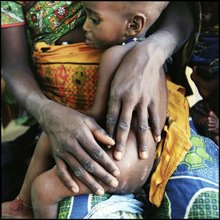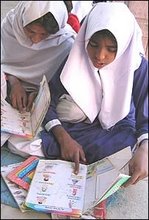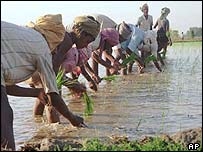PREAMBLE: Under the auspices of the United Nations, from 20 to 22 September 2010, a Summit on the Millennium Development Goals (MDGs) will be held in New York. With only five years left until the 2015 deadline to achieve the MDGs, UN Secretary-General Ban Ki-Moon has called on world leaders to attend the summit to accelerate progress towards these goals, the overall aim of which is to reduce World Poverty. Visit the Summit website! http://www.un.org/en/mdg/summit2010/
Despite the dire need of over a billion people living in poverty around the world, the initial intentions behind the goals and efforts to showcase what had been achieved, it is increasingly clear that few if any of the MDGs will be achieved by the target year of 2015. Clearly there is a crying need for a strong reaffirmation with donor policies and resources to match.
Unfortunately, recent years have witnessed a track record littered with false promises and broken commitments and in some instances shallow comprehension of what is needed to resolve on the major issues underlying world poverty. All too often, “world leaders” have pandered to their domestic political bases rather than genuinely taking on these issues.
A case in point is Canada’s minority Conservative government whose leader Stephen Harper and fundamentalist colleagues ensured that this country’s commitment to address maternal and child health (MCH) excluded access to safe abortion, and made only weak provisions for the inclusion of family planning within Canadian funding commitments.
In fact, it is estimated that 20 million unsafe abortions occur around the world annually and that 70,000 of these result in the woman's death. Clearly there must be more emphasis on the provision of family planning, and removal of barriers to this practice and also quite obviously access to safe abortion, as a core element of a harm reduction strategy.
Harper’s approach to maternal health is in effect a northern echo of the Bush administration’s “global gag rule” (no funding for MCH unless abortion is specifically excluded), since repudiated by the Obama administration. Ironically, women in Canada long ago won the right to chose, so it is invidious that “Harper’s Canada” discriminates against these practices abroad.
There is still hope that Canada may amend this approach reasonably soon, with the return of a more compassionate philosophy. What is needed is to change the party in power, the only currently viable alternative being the Liberal Party of Canada, with (virtually guaranteed) support from all other parties: only the Conservatives (with little more than 30% public support) are holding up the need for enlightened policy.
We therefore endorse the following statement (Globe and Mail, Feb 2, 2010) made by the leader of that party, and of the official opposition Michael Ignatieff: “We want to make sure that women have access to all the contraceptive methods available to control their fertility because we don’t want to have women dying because of botched procedures, we don’t want to have women dying in misery.” This quote regains resonance in light of the looming MDG Summit next week in New York.
This example of Maternal and Child Health (MDG 5) is but one of the MDGs falling short of sufficient progress for any of them to be achieved by 2015 without an infusion of more genuine commitment by “world leaders” such as Mr Harper.
The eight MDGs are now listed for ease of reference:
Goal 1: Eradicate Extreme Poverty and Hunger
Goal 2: Achieve Universal Primary Education
Goal 3: Promote Gender Equality and Empower Women
Goal 4: Reduce Child Mortality
Goal 5: Improve Maternal Health
Goal 6: Combat HIV/AIDS, Malaria and other diseases.
Goal 7: Ensure Environmental Sustainability
Goal 8: Develop a Global Partnership of Development.
NOTE: This internationally agreed framework of 8 goals and 18 targets is complemented by 48 technical indicators to measure progress towards the Millennium Development Goals. These indicators have since been adopted by a consensus of experts from the United Nations, IMF, OECD and the World Bank.
As our feature for this issue, we present below a September 10, 2010 IPS Inter-Press Service report by Aprille Muscara (full reference below).
GLOBAL DEVELOPMENT BLUEPRINT REVEALS URGENT UPHILL BATTLE
By Aprille Muscara
UNITED NATIONS, Sep 10, 2010 (IPS) - A document outlining the U.N.'s strategy to achieve the Millennium Development Goals (MDGs) by 2015 was finalised Thursday after months of heated negotiations.
The text, titled "Keeping the Promise – United to Achieve the Millennium Development Goals", will be formally signed off on by world leaders at the upcoming MDG summit, which is to be held here from Sep. 20-22.
The final 27-page version, obtained by IPS, differs considerably from the 14-page "zero draft" base text from which member states inserted, amended and removed passages.
However, non-governmental organisations (NGOs) worry that the completed text, called an outcome document, falls short of the substantial action plan it was hoped to be and is instead a rehash of already-made promises and generalised commitments.
"This document lacks the adrenaline boost to accelerate the MDGs, and with only five years left, world leaders coming together in New York must commit to concrete actions that will ensure all people are lifted from poverty in our lifetime," said Emma Seery, a spokesperson for Oxfam International.
Over the years, NGOs and aid groups have advocated for a human rights-based approach to tackling the MDGs. A review of the document at different draft stages reveals the addition of key human rights language, such as inclusion of the right to development, the right to food, the right to health and the right to education.
"We recognize that the respect, promotion and protection of human rights is an integral part of effective work towards achieving the MDGs," the final document states.
But notably absent from the list is access to clean water and sanitation, which the U.N. in a resolution declared a basic human right in late July. The resolution proved to be a divisive one, however, with 41 countries, including the United States, Britain and Canada abstaining from the vote.
Although water and sanitation is not explicitly framed as a human right in the final outcome document, they appear frequently throughout as basic needs essential to achieving the MDGs.
Absent, as well, is the assertion "that gender equality is a basic human right, a fundamental value and an issue of social justice" – a statement that was inserted during the draft process but failed to make it through to the end. The final version reads: "We acknowledge the importance of gender equality and empowerment of women to achieve the MDGs."
Indeed, the evolution of the outcome document, which at one point ballooned to 38 pages, reflects a process of political wrangling over touchy wording. With its numerous additions and amendments, the final product is at once more specific in its language yet still general in its pledges.
Language on peace and security matters appears to have been especially contentious. For instance, references to "armed violence," present in the zero draft, and "transnational crime" and "trafficking in persons," introduced in subsequent drafts, as posing threats to the attainment of the MDGs have been removed entirely in favour of the more benign "conflict."
However, one instance of both "foreign occupation" and "terrorism" – new additions – as hindering achievement of the MDGs appear in the final version, reflecting a political compromise between the Group of 77, a coalition of developing countries, and the European Union and the United States.
In the final stages of ironing out problematic language, the E.U. and U.S. and the G77 were often on opposing sides in typical developed-developing, North-South fashion.
It is common practice, a U.N official told IPS, for the relevant parties to go to extremes in their proposed amendments in anticipation of having to make concessions.
Thus, the G77's insertions that claim the current global financial structure – from trade to aid – is "non- inclusive," "ineffective" and "inadequate" for developing countries were removed in place of more watered down wording stressing the need to further reform international financial systems.
A greater focus on the particular needs of the developing world, rural populations and specific mention of regional efforts by the global South in attaining the MDGs are also additions, reflecting G77 bargaining.
Meanwhile, the importance of parliaments, national ownership in developmental efforts and mutual accountability for commitments made towards achieving the MDGs suggest concessions made to the West.
Among the other numerous differences from the zero draft is an acknowledgement of the impact of the world financial crisis, volatile food and energy prices and humanitarian emergencies in stunting developmental gains. And of the eight goals, the document characterises maternal health, MDG5, as making the slowest progress. [Emphasis Added]
Also added is a litany of references to U.N. conventions, agreements and agencies, which serves to reinforce the commitments and goals made in those forums, but also highlights the world body's role in ensuring the accountability of governments.
To this end, the final document requests a "Special Event" to take place during the 68th session of the general assembly in 2013, two years shy of the deadline, to follow up on efforts made toward achieving the MDGs.
Ultimately, despite its acknowledgement of the uneven advances made thus far, the document reflects the urgent uphill battle left on the path to 2015.
"Progress on other MDGs is fragile and must be sustained to avoid reversal," it states.
Source: Muscara A. Development Blueprint Reveals Urgent Uphill Battle. IPS Inter-Press Service. Geneva Sept 10, 2010. http://www.ipsnews.net/news.asp?idnews=52788
FROM a Great Canadian and World Statesman
"A great gulf... has... opened between man's material advance and his social and moral progress, a gulf in which he may one day be lost if it is not closed or narrowed..."
Lester B Pearson
http://nobelprize.org/nobel_prizes/peace/laureates/1957/pearson-lecture.html
Tuesday, 14 September 2010
MILLENNIUM DEVELOPMENT GOALS – OUR UNDERACHIEVING “LEADERSHIP”
Labels:
ABORTION,
Ban Ki Moon,
Canada.,
child health,
conservative,
deaths,
FAMILY PLANNING,
Harper,
Ignatieff,
liberal,
Maternal health,
MDGs,
New York,
Obama,
OXFAM,
Seery,
UN Summit
INSPIRATIONAL WELCOME ............................... from T.S.Eliot's "Little Gidding"
If you came this way From the place you would come from... It would be the same at the end of the journey...
If you came, not knowing what you came for, It would be the same... And what you thought you came for Is only a shell, a husk of meaning... From which the purpose breaks only when it is fulfilled If at all.


























